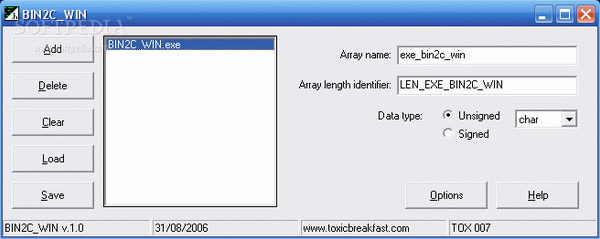BIN2C_WIN 1.0 Crack + Activation Code Updated
BIN2C_WIN is a useful and free programming utility for Windows, used for converting binary files (like picture files, sound files or in fact any file format you care to name) into C arrays that can be used directly by your C program. There are many advantages to doing this.
Less files

Download BIN2C_WIN Crack
| Software developer |
toxicbreakfast
|
| Grade |
3.0
880
3.0
|
| Downloads count | 7325 |
| File size | < 1 MB |
| Systems | Windows All |
You do not have to distribute so many files with your program - they are all contained within the executable.
Less disk reads
The resources automatically load with the program - you do not have to read from the disk each time you want to access the file.
Less coding
You don't have to write any code to load your resources into memory.
Less disk space
Since the resources are contained within the program code, using an executable compressor like UPX on your program will also reduce the space taken up by those resources.
Restrict access
The resource files are not readily editable by the user.
There are many small programs and scripts available that already perform this function. Most of them seem to go under the snappy title of BIN2C. However, most of these are command line utilities which don't allow for easy interaction. I wanted a graphical interface and, not satisfied with the features on any existing programs I found, decided to write my own; hence the less snappily titled BIN2C_WIN Serial.
Why use this in Windows? Depends what you're doing. The Windows API has a built-in method for handling resources compiled with rc.exe (the Microsoft resource compiler) or its clones, and that method is the best for most Windows applications. For some programs though, you need direct access to the data and the API gets in the way. One example would be coding an SDL application. You may also be using Windows as development environment for a different platform. BIN2C_WIN is more flexible than many similar utilities.
Select one or more resource files from one or more directories.
Place your arrays into one single header file or many different files.
Set individual array names and data types for each resource.
Set defaults for the array names and data types. For example, you could automatically declare every array as unsigned char sprite_filename
Easily add, remove or update arrays in a previously created header file.
